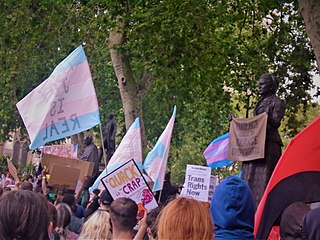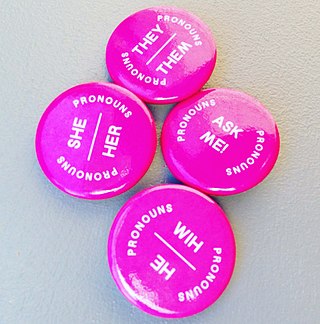Related Research Articles

The U.S. Equal Employment Opportunity Commission (EEOC) is a federal agency that was established via the Civil Rights Act of 1964 to administer and enforce civil rights laws against workplace discrimination. The EEOC investigates discrimination complaints based on an individual's race, color, national origin, religion, sex, age, disability, genetic information, and retaliation for participating in a discrimination complaint proceeding and/or opposing a discriminatory practice.

Transgender rights in Canada, including procedures for changing legal gender and protections from discrimination, vary among provinces and territories, due to Canada's nature as a federal state. According to the 2021 Canadian census, 59,460 Canadians identify as transgender. Canada was ranked third in Asher & Lyric's Global Trans Rights Index in 2023.

Lesbian, gay, bisexual and transgender (LGBT) rights in the United States rank among the most advanced in the world, with public opinion and jurisprudence changing significantly since the late 1980s.
The Canadian Human Rights Commission (CHRC) was established in 1977 by the Government of Canada. It is empowered under the Canadian Human Rights Act to investigate and to try to settle complaints of discrimination in employment and in the provision of services within federal jurisdiction. The CHRC is also empowered under the Employment Equity Act to ensure that federally-regulated employers provide equal opportunities for four designated groups: women, Aboriginal people, the disabled, and visible minorities. The Commission helps enforce those human rights and inform the general public and employers of those rights.
The Equality and Human Rights Commission (EHRC) is a non-departmental public body in Great Britain, established by the Equality Act 2006 with effect from 1 October 2007. The Commission has responsibility for the promotion and enforcement of equality and non-discrimination laws in England, Scotland and Wales. It took over the responsibilities of the Commission for Racial Equality, the Equal Opportunities Commission and the Disability Rights Commission. The EHRC also has responsibility for other aspects of equality law: age, sexual orientation and religion or belief. A national human rights institution, it seeks to promote and protect human rights throughout Great Britain.

The Equality Act 2010, often erroneously called the Equalities Act 2010, is an act of Parliament of the United Kingdom passed during the Brown ministry with the primary purpose of consolidating, updating and supplementing the numerous prior Acts and Regulations, that formed the basis of anti-discrimination law in mostly England, Scotland and Wales; some sections also apply to Northern Ireland. These consisted, primarily, of the Equal Pay Act 1970, the Sex Discrimination Act 1975, the Race Relations Act 1976, the Disability Discrimination Act 1995 and three major statutory instruments protecting discrimination in employment on grounds of religion or belief, sexual orientation and age.

Human rights in Canada have come under increasing public attention and legal protection since World War II. Prior to that time, there were few legal protections for human rights. The protections which did exist focused on specific issues, rather than taking a general approach to human rights.
In the United States, the rights of transgender people vary considerably by jurisdiction. In recent decades, there has been an expansion of federal, state, and local laws and rulings to protect transgender Americans; however, many rights remain unprotected, and some rights are being eroded. Since 2020, there has been a national movement by conservative/right-wing politicians and organizations to target transgender rights. There has been a steady increase in the number of anti-transgender bills introduced each year, especially in Republican-led states.
The Human Rights Tribunal of Ontario is an administrative tribunal in Ontario, Canada that hears and determines applications brought under the Ontario Human Rights Code, the provincial statute that sets out human or civil rights in Ontario prohibiting discrimination on the basis of a number of grounds in certain social areas. It is one of the 13 adjudicative tribunals overseen by the Ministry of the Attorney General that make up Tribunals Ontario. Any person who believes they have been discriminated against under the Human Rights Code may bring an application to the Tribunal.

LGBT employment discrimination in the United States is illegal under Title VII of the Civil Rights Act of 1964; employment discrimination on the basis of sexual orientation or gender identity is encompassed by the law's prohibition of employment discrimination on the basis of sex. Prior to the landmark cases Bostock v. Clayton County and R.G. & G.R. Harris Funeral Homes Inc. v. Equal Employment Opportunity Commission (2020), employment protections for LGBT people were patchwork; several states and localities explicitly prohibit harassment and bias in employment decisions on the basis of sexual orientation and/or gender identity, although some only cover public employees. Prior to the Bostock decision, the Equal Employment Opportunity Commission (EEOC) interpreted Title VII to cover LGBT employees; the EEOC determined that transgender employees were protected under Title VII in 2012, and extended the protection to encompass sexual orientation in 2015.

The Justice Centre for Constitutional Freedoms (JCCF) is a Canadian legal advocacy organization specializing in a social conservative approach to the Canadian Charter of Rights and Freedoms. The libertarian organisation has partnered with several right-wing backers in the United States.
The Alberta Human Rights Commission (AHRC) is a quasi-judicial human rights commission in Alberta, Canada, created by the provincial government.
The participation of transgender people in competitive sports, a traditionally sex-segregated institution, is a controversial issue, particularly the inclusion of transgender women and girls in women's sports.
Kimberly Nixon is a transgender woman who filed a human rights complaint against Vancouver Rape Relief & Women's Shelter Society (VRRS) for discrimination. VRRS argued that Nixon, a transgender woman, did not have the same life experiences as a woman who was assigned female at birth, and could not volunteer as a peer rape counselor. She fought her case successively through the British Columbia Human Rights Tribunal, the Supreme Court of British Columbia, the British Columbia Court of Appeal, each of which rejected her complaint, and then eventually the Supreme Court of Canada, which dismissed her request to appeal the decision against her case on February 1, 2007.
Transgender rights in Australia have legal protection under federal and state/territory laws, but the requirements for gender recognition vary depending on the jurisdiction. For example, birth certificates, recognised details certificates, and driver licences are regulated by the states and territories, while Medicare and passports are matters for the Commonwealth.

Transgender rights in the United Kingdom have varied significantly over time, with transgender Britons facing certain social challenges not experienced by non-trans individuals. These include various laws and public attitudes in regards to identity documents, as well as anti-discrimination measures used by or pertaining to transgender people, in the areas of employment, education, housing and social services, amongst others.
The legal and regulatory history of transgender and transsexual people in the United States begins in the 1960s. Such legislation covers federal, state, municipal, and local levels, as well as military justice. It reflects broader societal attitudes which have shifted significantly over time and have impacted legislative and judicial outcomes.

Blaire White is an American YouTuber and political commentator. Describing her politics as center-right, many of White's videos have been centered around social issues such as transgender people, feminism, and Black Lives Matter.

Gender pronouns or personal gender pronouns are the set of pronouns that an individual uses to reflect that person's own gender identity. In English, when declaring one's chosen pronouns, a person will often state the subject and object pronouns, although sometimes, the possessive pronouns are also stated. The pronouns chosen may include neopronouns such as "ze" and "zir".
Jessica Simpson, commonly known by her former legal name, Jessica Yaniv, is a Canadian transgender activist in British Columbia who is best known for filing at least 15 complaints of discrimination on the basis of gender identity against various beauty salons after they refused to wax her male genitalia. The complaints were filed with the British Columbia Human Rights Tribunal in 2018 and 2019. It was the first major case of alleged transgender discrimination in retail in Canada. In 2019, the Tribunal rejected her complaints and ruled Yaniv had racist motives. In following years, Yaniv has gone on to make additional complaints of discrimination, libel and privacy breach.
References
- ↑ "Human Rights Tribunal". www.bchrt.gov.bc.ca. Retrieved 2019-06-04.
- ↑ "Ontario Human Rights Commission". Archived from the original on 2011-05-18. Retrieved 2008-06-06.
- ↑ "Archived copy" (PDF). Archived from the original (PDF) on 2008-05-16. Retrieved 2008-06-06.
{{cite web}}: CS1 maint: archived copy as title (link) - ↑ "Province tables human rights commission legislation". November 2018. Retrieved 2021-09-03.
- ↑ "Laying the foundations: Annual Report 2019/20 and Service Plan 2020/21–2022/23" (PDF). Retrieved 2021-09-03.
- ↑ Lindsay, Bethany (2021-09-26). "Mask and vaccine complaints swamp human rights tribunal, but many aren't about true discrimination". CBC News . Archived from the original on 2021-09-26. Retrieved 2024-05-18.
- ↑ "Complaints About Mask-wearing in Services Paused for One Year". BC Human Rights Tribunal. 2022-04-20. Archived from the original on 2023-11-09. Retrieved 2023-11-22.
{{cite web}}: CS1 maint: unfit URL (link) - ↑ "Notice: Complaints about mask-wearing in services paused for one year (archived)". BC Human Rights Tribunal. 2024-04-09. Archived from the original on 2024-05-18. Retrieved 2024-05-18.
- 1 2 "Smith and Chymyshyn v. Knights of Columbus" (PDF). Archived from the original (PDF) on 2013-05-13. Retrieved 2012-07-27.
- ↑ "B.C. tribunal awards lesbian couple damages". CTV.ca. Archived from the original on 2011-08-30. Retrieved 2012-07-27.
- ↑ Datt v. McDonald’s Restaurants (No. 3), 2007 BCHRT 324.
- ↑ Levant, Ezra (April 2, 2009). "Enough's enough: how McDonald's hand-washing policy was overruled". Maclean's. Rogers. Archived from the original on August 2, 2012. Retrieved August 25, 2012.
- ↑ Eva obo others v. Spruce Hill Resort and another, 2018 BCHRT 238.
- ↑ "Canada resort staff fired for being white". BBC News. 2018-11-01. Retrieved 2018-12-03.
- ↑ "B.C. Human Rights Tribunal finds resort owner schemed to replace Caucasian workers | CBC News". CBC. Retrieved 2018-12-03.
- ↑ Greenfield, Beth (July 24, 2019). "Trans woman who was refused waxing services kicks off identity wars online". Yahoo! News. Retrieved 5 August 2019.
- 1 2 Little, Simon (July 29, 2019). "B.C. Human Rights Tribunal to take up to 3 months to decide transgender waxing case". Global News. Retrieved 3 August 2019.
- ↑ Uguene-Csenge, Eva (July 26, 2019). "Transgender woman testifies at human rights tribunal after being refused Brazilian wax". The Canadian Broadcasting Corporation. Retrieved 3 August 2019.
- ↑ "When one person's right is another's obligation". The Economist. October 27, 2018. Retrieved 7 August 2019.
- ↑ Urban, Rebecca (August 8, 2019). "Feminists reject transgender law change". The Australian. Retrieved 7 August 2019.(registration required)
- ↑ Brean, Joseph (22 October 2019). "Trans activist Jessica Yaniv filed genital wax complaints as means of 'extortion,' rights tribunal rules". The National Post. Retrieved 22 October 2019.
- ↑ Forgie, Adam (22 October 2019). "Court rules in favor of women who refused to wax male genitalia of trans woman". KUTV (CBS). Retrieved 22 October 2019.
- ↑ "Yaniv v. Various Waxing Salons (No. 3), 2019 BCHRT 244" (PDF). BC Human Rights Tribunal. Retrieved September 30, 2020.
- ↑ National Post (January 7, 2020). "Rights centre says trans activist Jessica Yaniv has filed new complaint against B.C. salon over waxing refusal". The Spruce Grove Examiner. Retrieved September 30, 2020.
- ↑ Desai, Devika (August 27, 2020). "Trans activist Jessica Yaniv files second lawsuit against three beauticians". Toronto Sun. Retrieved September 30, 2020.
- ↑ "COVID-19 complaints". BC Human Rights Tribunal. 2024-01-29. Archived from the original on 2024-05-18. Retrieved 2024-05-18.
- ↑ Rael v. Cartwright Jewelers and another, CanLIIBCHRT 106 (British Columbia Human Rights Tribunal2021-08-19)("While complainants are not required, for valid privacy reasons, to divulge detailed particulars of their disability when seeking accommodation, they should, at a minimum, inform a service provider that they require some form of disability-related accommodation to trigger a service provider’s duty to accommodate."), archived from the original.